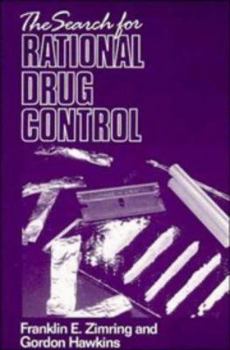The Search for Rational Drug Control
Select Format
Select Condition 
Book Overview
This book presents a comprehensive examination of the drug control policy process in the United States. How are policy choices identified, debated and selected? How are the consequences of... This description may be from another edition of this product.
Format:Paperback
Language:English
ISBN:0521558824
ISBN13:9780521558822
Release Date:August 1995
Publisher:Cambridge University Press
Length:240 Pages
Weight:0.71 lbs.
Dimensions:0.7" x 5.9" x 8.8"
Customer Reviews
1 rating
well posed pro and con arguments
Published by Thriftbooks.com User , 16 years ago
How to reduce the usage of narcotics? Zimring and Hawkins take a sober and unemotional look at the history of anti-narcotics efforts throughout the world. Their book gives some perspective on what measures might be effective, and what might not be. In one chapter, there is a look at prohibition measures throughout history. With especial details on the Prohibition of alcohol in the US during the 1920s and 30s. This led to widespread bootlegging and a massive growth in organised crime. All of which was ultimately driven by a large and persistent demand amongst the populace; that did not diminish with Prohibition. The chapter also looks at the anti-cannabis movement, that only started in the 20s. A reader might read the discussion about the failure of Prohibition and see clear parallels with contemporary US narcotics policies. However, the book does counterbalance. The authors are not (presumably) shaggy potheads. For the case of heroin, the book asks what if indeed heroin became legal and cheap? This might uncut the economics of much organised crime, and reduce the concomitant murders in the drug trade. And some advocate legalising, because that might actually reduce the usage rate. But suppose that more people now become addicted, due to its enhanced availability and affordibility. The lower productivity of heavy heroin addicts has been well documented. Here, the addictive power of heroin is strong enough that this argument against legalisation should give many pause. Note however that this is specific to heroin, and other drugs of similar potency. For milder narcotics, like marijuana, that are less addictive, legalisation might have more validity. The book is a well balanced treatment of both sides of the legalisation debate. Interested readers might also consider a related text, that focuses just on the Marijuana debate: Marijuana: Costs of Abuse, Costs of Control (Contributions in Criminology and Penology).






